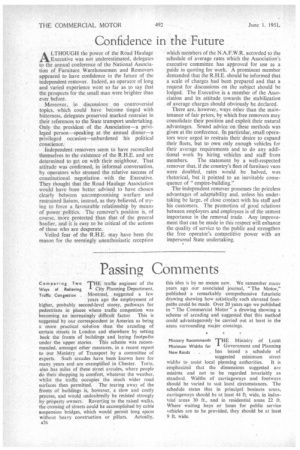Confidence in the Future
Page 28

If you've noticed an error in this article please click here to report it so we can fix it.
ALTHOUGH the power of the Road Haulage Executive was not underestimated, delegates to the annual conference of the National Association of Furniture Warehousemen and Removers appeared to have confidence in the future of the independent remover. Indeed, an operator of long and varied experience went so far as to say that the prospects for the small man were brighter than ever before.
Moreover,. in discussions on controversial topics. which could have become tinged with bitterness, delegates preserved marked restraint in their references to the State transport undertaking. Only the president of the Association—a privileged person—speaking at the annual dinner—a privileged occasion—unburdened his political conscience.
• Independent removers seem to have reconciled themselves to the existence of the R.H.E. and are determined to get on with their neighbour. That attitude was confirmed, in informal conversation, by operators who stressed the relative success of constitutional negotiation with the Executive. They thought that the Road Haulage Association would have been better advised to have chosen clearly between uncompromising warfare and restrained liaison, instead, as they believed, of trying to force a favourable relationship by means of power politics. The remover's position is, of course. more protected than that of the general haulier, and it is easy to be critical of the actions of those who are desperate.
Veiled fear of the R.H.E. may have been the reason for the seemingly unenthusiastic reception which members of the N.A.F.W.R. accorded to the schedule of average rates which the Association's executive committee has approved for .use as a guide in quoting for work. A prominent member demanded that the R.H.E. should be informed that a scale of charges had been prepared and that a request for discussions on the subject should be lodged. The Executive is a member of the Association and its attitude towards the stabilization of average charges should obviously be declared.
There are, however, ways other than the maintenance of fair prices, by which free removers may consolidate their position and exploit their natural advantages. Sound advice on these methods was given at the conference. In particular, small operators were urged to restrain their desire to expand their fleets, but to own only enough vehicles for their average requirements and to do any additional work by hiring vehicles and staff from members. The statement by a well-respected remover that, if the country's fleet of furniture vans were doubled, rates would be halved, was rhetorical, but it pointed to an inevitable consequence of "empire-building."
The independent remover possesses the priceless advantages of adaptability and, unless his undertaking be large, of close contact with his staff and his customers. The promotion of good relations between employers and employees is of the utmost importance in the removal trade. Any improvement that can be made in this respect will enhance the quality of service to the public and strengthen the free operator's competitive power with an impersonal State undertaking.




























































































